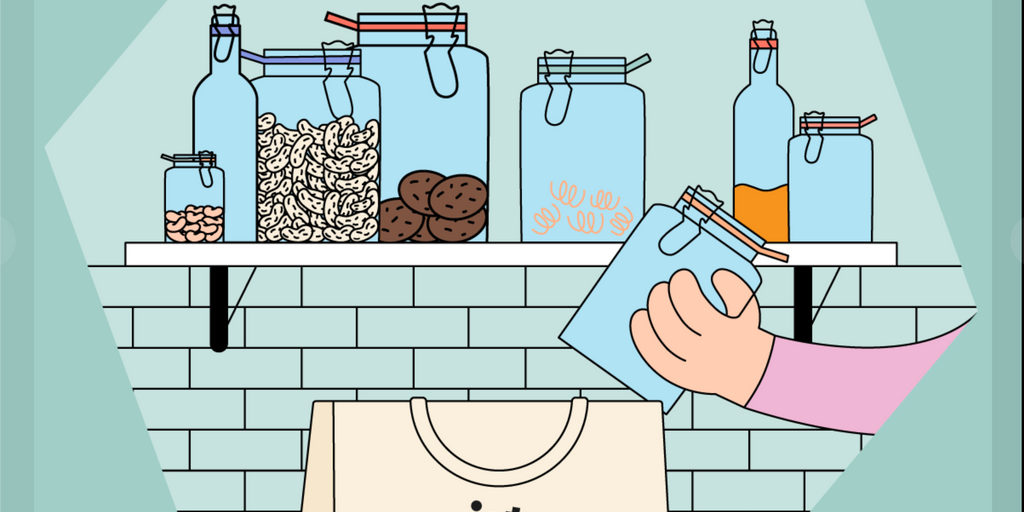Introduction
Zero waste grocery shopping is outgrowing the niche, stimulated by Dutch startup Pieter Pot which makes it ecovenient to do groceries without packaging. With its current waiting list of 45,000 consumers, investments of 3M+ and steep growth since it existence of less than 1 year, it is on a mission to make circular packaging the norm.
What is it?
Dutch first online package-free supermarket Pieter Pot brings ‘ecovenience’ to circular packaging.
Dutch startup Pieter Pot, a circular supermarket in the Netherlands, is pioneering a new way to shop for groceries by allowing its consumers to purchase groceries without producing any waste through its deposits and delivery system by packaging all its items in glass pots.
Based in Rotterdam, Pieter Pot was founded in 2019 and launched nationally in May 2020 by Jouri Schoemaker and Martijn Bijmolt. The zero-waste supermarket helps consumers reduce waste while buying their groceries through a convenient deposit and delivery system.
The company initially raised EUR€300,000 (US$364,278) and received a EUR€100,000 (US$121,426) one-time subsidy to support its work. Late last year, in November 2020, Pieter Pot received EUR€2.7 million (approx US$3.2 million) from three sustainability-focused investment funds: Shift Invest, Future Food Fund and InnovationQuarter, enabling the supermarket to scale up operations. Pieter Pot has currently over 45,000 consumers on its waiting list. It currently serves 10,000 customers on a monthly basis.
Compared to regular supermarkets that offer over 30,000 items, Pieter Pot offers about 300 non-perishable and long-lasting products, such as rice, lentils, cookies, olive oil and ketchup, and the number of Witems is a conscious effort by the founders to limit choices per category resulting in a larger variety of quality products. Aside from this, by shortening the supply chain and by directly delivering to the consumer, they’re able to sell their products at an affordable price.
Usually, consumers don’t want the extra trouble of going to the store physically and having to get their pots and packages refilled in the supermarket. This is why all package-free stores that opened up in the Netherlands in 2015 with lots of media attention, all had to close their doors within 9 months. Pieter Pot aims to tackle that by having a delivery system in place: bringing the filled jars at your door and taking back your empty ones, returning your deposit. This all contributes to the founder’s vision to make circular packaging ‘ecovenient’: ecofriendly ánd convenient. This means low effort, not paying much more than the regular supermarket and in very attractive glass mason jars.
How does Pieter Pot work?
First, you add yourself to the waiting list and once you make it to the top of the list, you order the items you need on the website, choose a delivery date, and then through Dutch post PostNL’s special food delivery service, your items will be delivered along with one or more burlap deposit bags filled with deposit glass pots.
Once empty, consumers can collect their pots in the bags and hand them back to the delivery person with their next delivery. Once the pots make it back to Pieter Pot, the deposit for both the bags and pots will be transferred to the user’s account which they can then use as credit for their next order.
The supermarket buys its products in bulk directly from its suppliers to reduce waste across the entire supply chain and the pots are cleaned, filled at sheltered workshops and then used for delivery.
Sustainability
Pieter Pot makes sustainable impact in 2 ways: saving single-use packaging and lowering the CO2 footprint of a household doing groceries.
There is almost no packaging on the consumer side aside from the reusable pots and bags and the company uses reusable bulk packaging wherever possible. The printed paper labels on the pots – with all the necessary info about the product – are made from natural material that dissolves in water while washing. Through this system, Pieter Pot claims to already saved280,000 packaging units already, heading towards 1,000,000 packages saved in 2021.
The circular packaging of Pieter Pot has a significant lower CO2 footprint. Even if packaging gets recycled, it still costs a lot of energy. You can compare it to a bottle or a can of beer: bottles are the more sustainable option after they have been reused around ten times. Beer bottles are reused around 40 times. Also, when it comes to food packaging, not all recycled packaging is allowed to use again for food, because of the high standards that the package needs to have to be allowed to use as food packaging.
But what about the transportation of these pots? Pieter Pot claims that even if the consumer resides in a rural area, the pots are delivered in a non-electric vehicle and it is still lower than when the individual would personally visit a supermarket. More impact can be made when the weight of the circular packaging would be lower, that’s why Pieter Pot is developing a new, more sustainable lightweight pot that will replace the present glass pots.
Making circular packaging the norm.
Pieter Pot has the mission to make circular packaging the norm. They do not have the belief they can make this norm on their own. That why’s they believe they can create the blueprint to partner with both retailers, such as Albert Heijn and Picnic, the largest conventional and online-only supermarket chains in the Netherlands, and FMCG companies like Unilever, Nestlé and PepsiCo. All these parties have reached out to Pieter Pot in the past 9 months to explore collaborations.
More Information about Pieter Pot or do you want to join the waiting list? Visit www.Pieter-Pot.nl and sign up!

